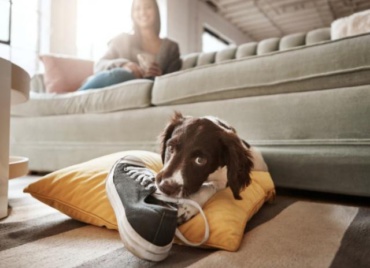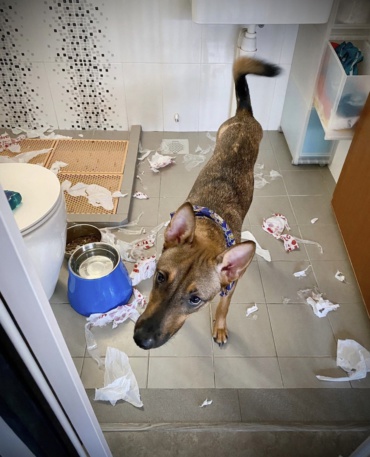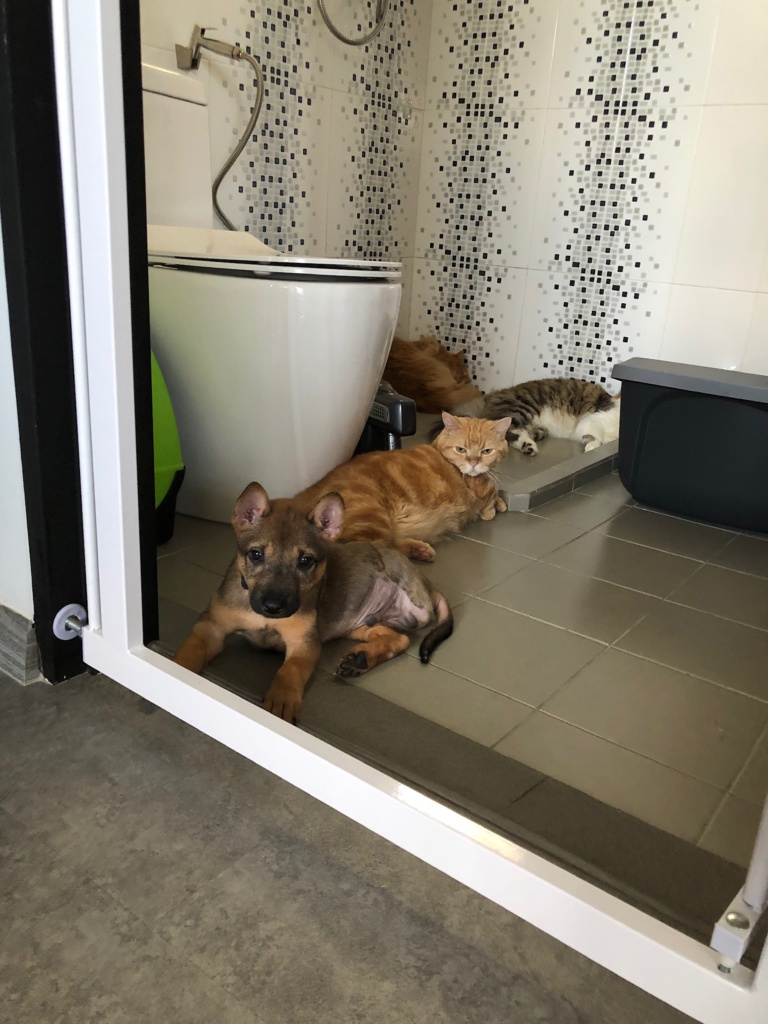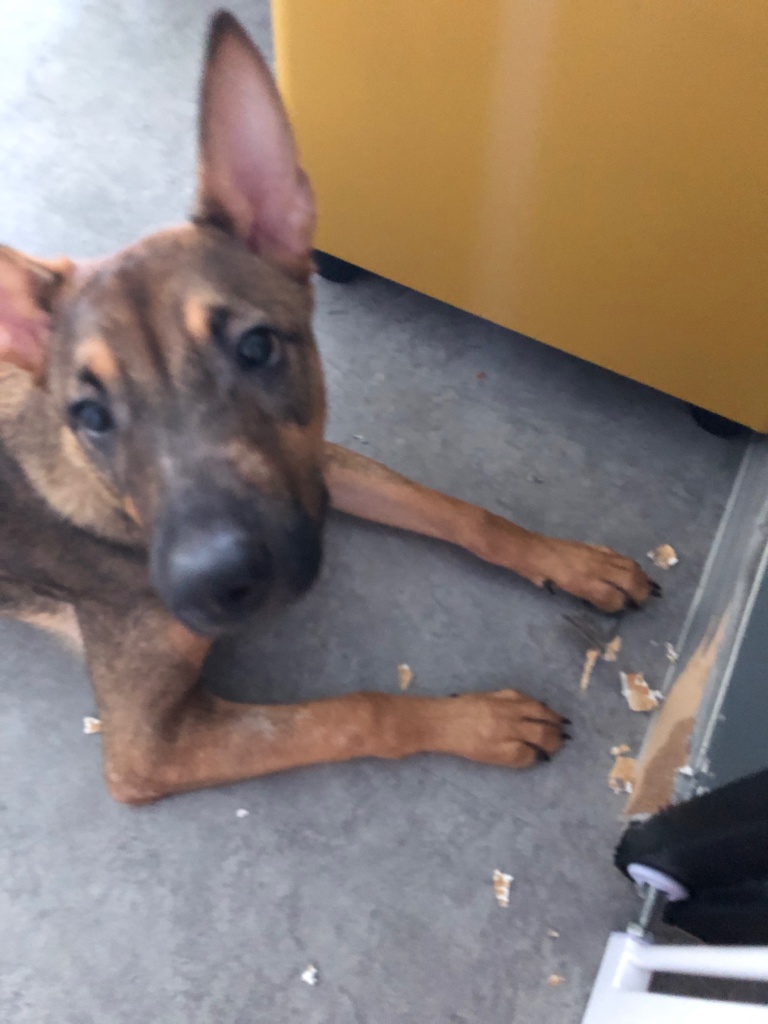Article originally published on The Spruce Pets. Written by Amy Bender. Refer to the original article here.
For puppies, the entire world is a chew toy. Puppies, like babies, explore the world with their mouths. Unfortunately, their explorations are not limited to their own toys. Your shoes, furniture, children’s toys, and anything else lying around your house are fair game for a teething puppy.
Unfortunately, your puppy may chew things that can harm it. You can put a stop to your puppy’s destructive behavior, but It takes time and consistent training.https://959980d490ba4ceaa2688c409992c87e.safeframe.googlesyndication.com/safeframe/1-0-37/html/container.html
Why Do Puppies Chew?
Most of the time, chewing is normal behavior for puppies and dogs, and it serves many purposes, such as strengthening their jaws and relieving anxiety.
Like babies, puppies experience discomfort while teething, and gnawing or chewing on things provides some relief. Boredom is another reason that puppies chew. Dogs are social animals and need stimulation for their mental health. If you’re not exercising your pup enough or giving it sufficient one-on-one time, it may seek attention by chewing inappropriate objects.
:max_bytes(150000):strip_icc():format(webp)/NatalieShuttleworth-5c3b7d4846e0fb0001ae57a9.jpg)
How to Stop Destructive Chewing
There aren’t many medical conditions other than teething that cause a puppy to chew on things, but it’s worth a trip to the vet just to be sure. If the vet gives your puppy a clean bill of health, there are several ways to prevent your puppy from wrecking your abode.
Puppy-Proof Your Home
Puppies should not have the full run of your home until they are completely trained. Many people choose to use the kitchen since it’s easier to clean up accidents on an uncarpeted floor.
Once you’ve decided on the areas where your puppy will be allowed to play, take a good look around and begin puppy-proofing. Pick up or move any objects that your puppy might decide to chew. Get down at the dog’s level to see what might appeal to it. Remove or cover any electrical wires, houseplants, garbage pails, children’s toys, and anything else you don’t want your puppy to chew or knock over.
Crate Train Your Puppy
While crate training is usually talked about in terms of house training, it is also a good tool for curbing destructive puppies. When you’re not able to supervise your puppy, crating can keep it and your home safe. If you don’t have a crate, you can confine the dog to a small, puppy-proof room such as a bathroom or kitchen.
Provide Your Puppy with Toys
Chewing allows puppies to ease teething pain, and it alleviates boredom. To prevent your puppy from getting in the habit of inappropriate chewing, make sure you provide it with lots of appropriate things to chew on.
Toys that work well for puppies are rubber toys with a hollow center, stuffed animals with squeakers inside, and nylon bones. Avoid animal bones, hooves, and antlers.
Don’t give your puppy old shoes or socks as playthings; you’re likely to cause confusion between which shoes are OK for chewing and which ones are off-limits.
There is some controversy over the safety of items like rawhides, pig’s ears, and other edible chews. Be sure to talk to your veterinarian before giving any of these items to your puppy.
:max_bytes(150000):strip_icc():format(webp)/MintImages-NorahLevine-5c3b7c9246e0fb0001ecc25f.jpg)
Rotate Your Puppy’s Toys
Since puppies chew to alleviate boredom, it’s a good idea to rotate your puppy’s toys every few days. A puppy will be looking for something new and interesting to sink its teeth into. By changing its toys around periodically, you’ll be keeping it interested in the things you want it to chew, and it will be less likely to start gnawing on the kitchen cabinets.
Offer a Swap
Try giving your puppy a treat in exchange for whatever inappropriate object it has in its mouth. This is a good way to train your dog to learn the command “give” if you repeat it before giving the treat. Over time, your puppy should learn that “give” means “give me that thing in your mouth!”
Just take care not to lavish your puppy with praise when it swaps the inappropriate object for a treat. You don’t want to turn it into a game where your puppy expects a reward for chewing on the wrong things.
Redirect Your Puppy
When you see your puppy begin to chew on something inappropriate, don’t scold it. Instead, move the puppy away from the object and redirect it to something you want it to chew. Make your puppy’s toy more interesting by squeezing a squeaky toy or shaking a bone while talking to it in a happy tone of voice. Give the pup lots of praise for chewing its toys.
If you think your puppy is teething, you can give it a doggy version of a teething ring: Dampen a washcloth; then place it in the freezer for about an hour. Give it to your puppy to tug and chew on, allowing the cold to soothe its sore gums.
Give Your Puppy Plenty of Exercise
A tired puppy is a happy puppy. Be sure to give your puppy enough playtime and cuddle time. If it’s had all of its puppy vaccinations, make walks part of your dog’s daily routine. If left to its own devices, your puppy is going to start looking for ways to burn off energy. This leads to destructive behavior. A puppy who gets regular exercise is much more likely to be well behaved.



